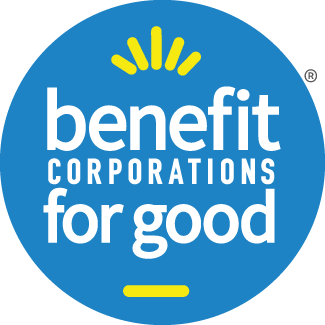Why a Portland Management Consulting Firm Followed Its Heart in Becoming a Certified Oregon Benefit Company
It’s difficult to listen in on a business conversation these days without hearing the word metrics. Measuring what you do is a critical component to a business’s success and longevity. And that accountability is a key reason why co-founders Trever Cartwright and Michelle Janke pursued certification as an Oregon Benefit Company.
For 13 years, their firm Coraggio Group has modeled the principles of the Triple Bottom Line of People, Planet and Profit. It’s always been in their blood and in their hearts. And then this year, they discovered an opportunity to certify those values and practices through Benefit Corporations for Good.
We interviewed Trever Cartwright recently about becoming a certified Oregon Benefit Company. Here’s what he had to say about his motivation for doing it and what it’s done for his business.
1. What motivated you to become a Benefit Company?
Since our founding in 2005, we’ve modeled so many of the Benefit Company principles. Though the Benefit Company certification didn’t exist at the time, we knew being accountable, courageous corporate citizens was important to us and that it needed to be central to who we were and what we stood for. As we’ve grown over the years, this commitment has been brought to life by the talented team members we hire—people who value serving the community, volunteering their time and making a positive difference in all that they do.
2. Was it difficult getting internal support for moving toward this model?
No. When my partner, Michelle Janke, and I brought the idea to our team there was no hesitation. Everyone knew becoming certified was right for our firm and would only reinforce the values and commitments we’ve been living since our founding.
3. How long did it take you to officially become a Benefit Company?
The process of becoming certified was seamless. It took about six weeks. Tom and Mary Anne were outstanding coaches and advisors and were with us from start to finish. We did the initial ‘sniff test,’ which affirmed for us that we were a good candidate. The certification questions definitely had some rigor to them for sure. We knew that, even if we didn’t achieve certification, the questions presented would serve as a good framework for making improvements in a few areas—which we’ve already started doing.
4. Have you seen any change in culture since you became a Benefit Company?
Becoming certified has been a shot of adrenaline in many ways. It has positively reinvigorated our internal discussions about our values and how we live them. We’ve redoubled our efforts around our commitment to Diversity, Equity and Inclusion. This has impacted how we think about growth, how we honor one another’s differences and have become more aware of the impact of our words and behaviors.
5. Have you experienced any positive outcomes since becoming a Benefit Company?
Though we’re fairly new to becoming a Benefit Company, we have taken steps to promote our certification—for example in our new business pursuits and firm collateral. At this point, the outcomes have been more internal. I believe the conversations we’re having have been elevated a notch or two in terms of our collective sense of responsibility and where we want to point this wonderful thing called Coraggio.
6. Would you recommend this business model to others? Why or why not?
Without hesitation. We do what we do because we believe that higher-functioning organizations lead to a higher-functioning world. It’s a perfect win/win outcome. The principles the Benefit Company model is based on providing a valuable framework for organizations to imagine and then take steps toward realizing their full potential. If leaders everywhere embraced this “rising tide lifts all boats” concept, the world truly would be a better place.
7. What is the most important trait to have as a conscientious leader of a Benefit Company?
The most important leadership trait is altruism. For us, this means having a deep commitment to impacting others and the world around us in a positive, lasting and meaningful way. If a leader doesn’t believe in this at their core, then becoming a Benefit Company is simply an empty marketing tactic.
8. What lessons have you learned in the process?
We’ve re-learned the importance of keeping the “why we do this” conversation alive within our firm. It’s important to give the “why” a voice in every meeting and every interaction we have with one another, with our clients and world around us.
9. Is being a Benefit Company part of your current Brand message?
We’re in the process of becoming more deliberate about this now. In many ways, it has been over the years, however the process of becoming Benefit Company has given us new context and clearer perspective on how to express our values and beliefs.
10. What is the single best reason you'd give for another company/peer to become a Benefit Company?
Becoming a Benefit Company is one of the most important steps founders can take to cement their legacy. My business partner and I intend for Coraggio to be a very special organization well beyond the years we spend in the firm. For us, making the decision to become a Benefit Company makes this intention very clear to future leaders of our firm. Selfishly, long after I’ve moved on, I expect to hear about the good work and positive difference Coraggio is making. And I look forward to telling all who will listen that I started that place.
You can learn more about Coraggio Group and its work here.
If you want to know more about why your business should become a benefit corporation, watch this.
—>Learn more about the 6 simple steps to becoming a certified Oregon Benefit Company or benefit corporation.
~benefitcorporationsforgood.com~

